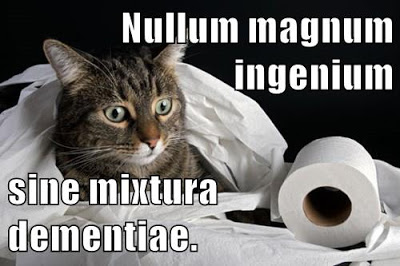- in: in, insde
- ex: out, out from
- sine: without
The ablative ending you need for the 1st-declension nouns and adjectives is the long -a (ā).
And here is a little slideshow (with cats) of the words you have seen before; now that your vocabulary is getting bigger and bigger, there are fewer new words for each set of new sayings.
And here are today's proverbs:
1. Simia in purpura.
(A) monkey in purple (robes).
SI-mia in PUR-pura.
The word purpura (purpurā) is the ablative form of the noun purpura gives us English "purple." This adjective is being used as a noun here, "(royal) purple (robes)."
1. Simia in purpura.
(A) monkey in purple (robes).
SI-mia in PUR-pura.
The word purpura (purpurā) is the ablative form of the noun purpura gives us English "purple." This adjective is being used as a noun here, "(royal) purple (robes)."
The idea is that if you give regal honors to an unworthy person, that person is still just as unworthy as they were before. Here's a variation: Simia est simia, etiam si purpura vestiatur, "A monkey is a monkey, even if dressed in purple."
2. Ex musca elephantem.
(Making an) elephant out-of (a) fly.
ex musca ele-PHAN-tem.
You know all these words already!
2. Ex musca elephantem.
(Making an) elephant out-of (a) fly.
ex musca ele-PHAN-tem.
You know all these words already!
The word musca (muscā) is the ablative form of the noun musca.
The word elephantem is the accusative form of the 3rd-declension noun, elephas.
Compare the English saying "making a mountain out of a molehill."
Notice that there is no explicit verb, but the fact that you have a noun in the accusative case means that you have an implied verb, and elephantem is the object of that verb (making, creating, fashioning, etc.).
3. Ars sine scientia nihil.
Technique without knowledge (is) nothing.
ars sine sci-EN-tia nihil.
You also know all these words too.
The word scientia (scientiā) is the ablative form of the noun scientia.
The Latin word ars has a wide range of meaning; "technique" is probably the best choice in this context. You can explore the many meanings of ars here.
This saying is famously associated wtih the Gothic architect Jean Mignot, who meant that the practice of masonry was useless without a knowledge of geometry.
4. Sine iustitia nulla libertas.
Without justice (there is) no freedom.
sine ius-TI-tia nulla li-BER-tas.
Yet another saying where you have seen all the words already!
The word iustitia (iustitiā) is the ablative form of the noun iustitia.
The noun libertas is a feminine noun of the 3rd declension, so it has a feminine adjective: nulla.
5. Nullum magnum ingenium sine mixtura dementiae.
(There is) no great genius without (an) admixture of-insanity.
nullum magnum in-GE-nium sine mix-TU-ra de-MEN-tiae.
The word mixtura (mixturā) is the ablative form of the noun mixtura, which gives us English "mixture, admixture."
The neuter noun ingenium, "intelligence, ability, genius," is new to you, but you've seen a related adjective: ingeniosus, as in English "ingenious." Because ingenium is a neuter noun, the adjectives nullum and magnum are also neuter.
The word dementiae is the genitive form of the noun dementia, a Latin word we use in English, "dementia." The root is men (ment-), "mind," and it means de-mentia, "away-from mind," as in the English expression "out of one's mind."
This saying comes from the essay De Tranquillitate by the Roman philosopher Seneca. paraphrasing Aristotle in Latin.
Here's a recap:
Plus the LOLCats!
Here's a recap:
- Simia in purpura.
- Ex musca elephantem.
- Ars sine scientia nihil.
- Sine iustitia nulla libertas.
- Nullum magnum ingenium sine mixtura dementiae.
Plus the LOLCats!





No comments:
Post a Comment
Comments are limited to Google accounts. You can also email me at laurakgibbs@gmail.com